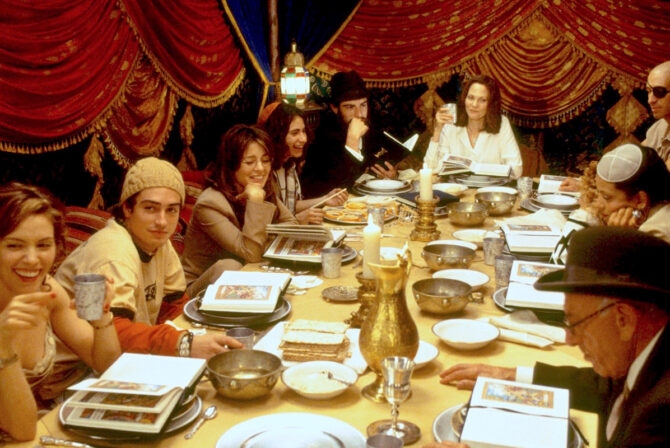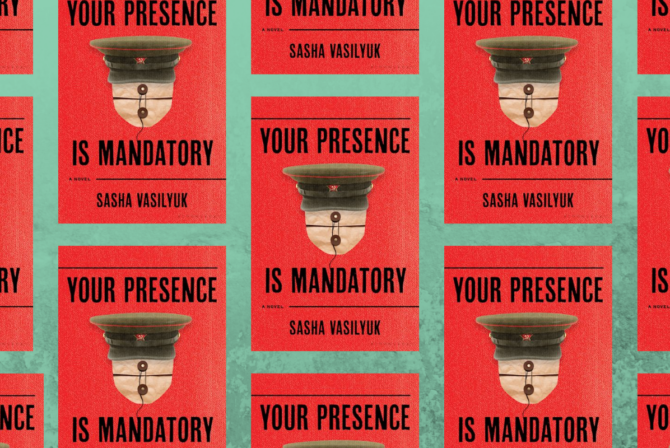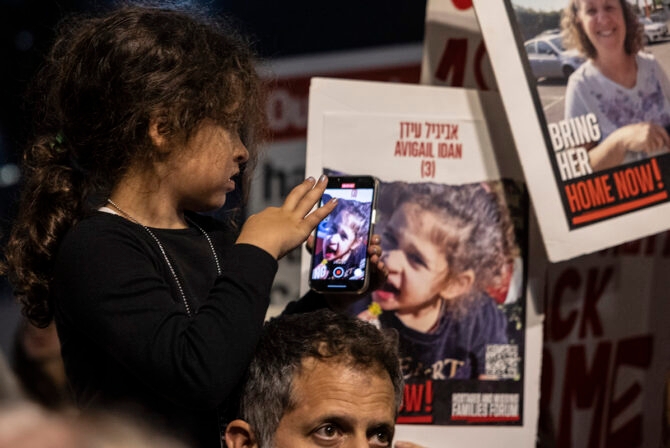As we’ve mentioned before, Zach Braff’s new movie “Wish I Was Here” gives us plenty to talk about here at Kveller. I sat down with three of the film’s stars, Zach Braff, Kate Hudson, and Mandy Patinkin, to talk about their Jewish connection to the movie, being a child no matter how old you are, and the hardest part about playing the role of a dying man. “Wish I Was Here” is now playing in select theaters, and will play nationwide starting tomorrow.
On the role Judaism plays in the film:
Zach Braff:
My brother Adam and I wrote this, and he’s 10 years older than me. When he was a kid, my parents put him in Yeshiva. By the time they got to me, they downshifted to Conservative and kosher. Both of us have grown up to be adults who organized religion does not work for. We love the jokes, we love the humor, we love the culture, we love the fun of the family gathering. But we don’t relate to anyone giving an eff if I have a bacon double cheeseburger, or a bearded man in the sky judging us.
And so I knew a lot of people of both religions–the two most common in this country–who were feeling the same way. My parents force-fed me this religion, and there’s aspects of it [that] I love, but what is my spirituality right now? What do I believe? How can I reconcile my belief in science with faith? And gosh, once I start having children, what the hell am I going to teach them? We just thought that was a really interesting thing to write about, because no one else seemed to be making a movie about it.
Mandy Patinkin:
The Jewish thing had nothing to do with it in terms of my interest. As a matter of fact, I don’t see it as a Jewish film at all. It’s a universal story about a family connecting, of parents and children and grandchildren. It reminds me of years ago when I did a Yiddish album called “Mamaloshen,” I had a friend take a photograph of me and it was a black-and-white photograph, but I put it in front of an American flag. Because for me it was a story about an immigrant, and it could have been any immigrant. It just happened that the story I was trying to tell–I’m of Jewish heritage. I remember after I recorded the piece, the Asian musicians and the African-American musicians who played on all my other albums said, “You know, we play on all your stuff and this one is the one that got us the most. We couldn’t understand a word of it, but it really affected us the most.”
On the relationship between parents and their kids:
Kate Hudson:
That to me was the biggest thing I responded to after reading this script. At the end of the day, everything that your parents are and everything that your parents told you and everything that they’ve given you, all you want is to know that they’re proud, and how much they love you, it’s deeply emotional. It’s everything you need as a child, no matter how old you are.
Zach Braff:
It’s really what the whole movie is about. Whereas “Garden State” was about someone discovering romantic love–being rescued by romantic love for the first time in his young life–this is about familial love, and really it all comes down to that. It will shape the rest of [your children’s] life, how much you love them. And they need to know it.
People our age are starting to deal with the concept of, “Oh my god, I will have to say goodbye to my parents at some point.” My dad’s 79 and, thank God, super healthy, but you know, in my mind, I’m still grappling with that. So we also wanted to write about that.
Mandy Patinkin:
I love what the movie has to say. The movie is about my life. I’m a father; I have two sons, 31 and 27. I’ve made mistakes. I’m not perfect. I don’t think it’s possible to fix the mistakes. I think it’s only possible to move forward and do the best I can. .
On the theme of death in the movie:
Mandy Patinkin:
I watched my own father’s death. And my mother just died two weeks ago. She was 89, lived a glorious life, her mind was 100 percent, and her body was finished. I love the beginning of life: birth, trees, spring, the sun rising. Even the sun setting, stars, night. I love everything in life: the sounds, birds, oceans. I have no regard for death. I don’t like it, I think it’s a flaw in the system, I’m not ready for it. I’m hoping when the time comes time will make me ready. I don’t get it. I don’t understand it. I watched this woman who made my life, who I’d been with through everything, be there one moment and the next, not in a familiar way that I’m acquainted with.
When you’re playing a dying person, you’re more alive than you’ve ever been in your life. So you don’t get ready to die, you get ready to live more. You listen harder, you are more awake, you pay attention with more energy, you’re quieter, you’re more present. You’re wiser in terms of mistakes you’ve made in the past that you don’t want to make at this moment. Because you also don’t know what the future holds. A dying man doesn’t know he’s going to die. You don’t know anything, I don’t know anything.
With “Homeland” people are always saying to me, so what’s going to happen? I told the writers not to tell me. I don’t want to know. I’m going to get it seven to 10 days ahead of time to learn the words, but I don’t know what’s going to happen in Mandy’s life. I don’t know the next question at this table, I don’t know how I’m going to react or what I’m going to say. Why should Saul Berenson know?
So I love that part of life, that I have no idea what the future is. And I think the dying man depends on that.
And in case you were wondering what celebrities do while being interviewed all day, I managed to swipe this original doodle from Kate Hudson (and then immediately proceeded to get chocolate on it). Enjoy!
Like this post? Get the best of Kveller delivered straight to your inbox.










